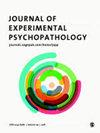与抑郁相比,社交焦虑更好地解释了在条件反射任务中对带有负面评价的面孔的自我报告焦虑的增强习得
IF 1.9
4区 医学
Q4 PSYCHIATRY
引用次数: 2
摘要
先前的研究表明,社交焦虑与焦虑习得的增强有关,这是通过在以面孔为条件刺激和以消极评价为非条件刺激的条件反射任务中的主观评分来衡量的。然而,最近的一项研究未能复制这种效果。本研究在更大的样本范围内重新审视了习得增强效应,探讨了消极评价期望的差异是否可能是一个潜在的机制,并比较了社交焦虑和抑郁对习得增强的贡献。263名未被选中的参与者参加了一项差异条件反射任务,在这项任务中,三张面孔分别在习得期间与敌对、中立和友好的反应配对,而在消失期间,这三张面孔都与中性反应配对。结果重复了先前的发现,即参与者的社交焦虑与焦虑的习得增强有关。社交焦虑的参与者在习得过程中没有表现出更高的敌意反应预期,这表明需要考虑增强习得的其他机制。抑郁也与习得增强有关;然而,这种联系是由社交焦虑造成的。社交焦虑的影响显著高于抑郁,支持其诊断有效性。本文章由计算机程序翻译,如有差异,请以英文原文为准。
Social anxiety compared to depression better accounts for enhanced acquisition of self-reported anxiety toward faces paired with negative evaluation in a conditioning task
Previous studies have shown that social anxiety was associated with enhanced acquisition of anxiety as measured by subjective ratings in conditioning tasks using faces as the conditioned stimulus and negative evaluation as the unconditioned stimulus. However, a recent study failed to replicate the effect. The current study re-examined the enhanced acquisition effect with a larger sample, explored whether differences in expectancy of negative evaluation was a potential mechanism, and compared the contribution of social anxiety to that of depression on enhanced acquisition. Two hundred and sixty-three unselected participants took part in a differential conditioning task in which three faces each were paired with hostile, neutral, and friendly reaction during acquisition, and all three were paired with neutral reaction during extinction. Results replicated earlier findings that participant social anxiety was associated with enhanced acquisition of anxiety. Socially anxious participants did not show higher expectancy of hostile reaction during acquisition, which suggested the need to consider alternative mechanisms underlying enhanced acquisition. Depression was also associated with enhanced acquisition; however, that association was accounted for by social anxiety. The effect of social anxiety was significant over and above depression, which supported its diagnostic validity.
求助全文
通过发布文献求助,成功后即可免费获取论文全文。
去求助
来源期刊

Journal of Experimental Psychopathology
Medicine-Psychiatry and Mental Health
CiteScore
2.00
自引率
0.00%
发文量
19
审稿时长
11 weeks
期刊介绍:
The Journal of Experimental Psychopathology (EPP) is an open access, peer reviewed, journal focused on publishing cutting-edge original contributions to scientific knowledge in the general area of psychopathology. Although there will be an emphasis on publishing research which has adopted an experimental approach to describing and understanding psychopathology, the journal will also welcome submissions that make significant contributions to knowledge using other empirical methods such as correlational designs, meta-analyses, epidemiological and prospective approaches, and single-case experiments.
 求助内容:
求助内容: 应助结果提醒方式:
应助结果提醒方式:


